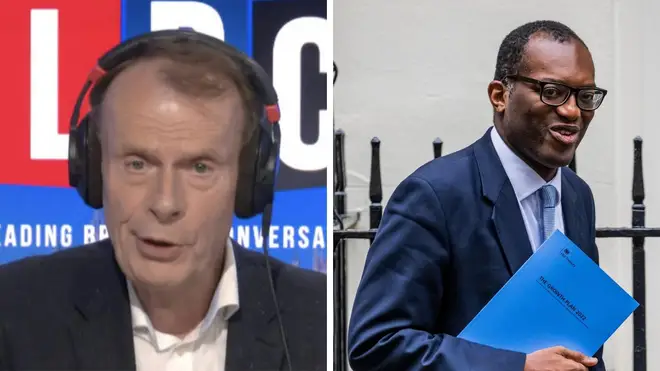
James Hanson 4am - 7am
23 September 2022, 15:38 | Updated: 14 October 2022, 13:30

Yes, today’s quasi-Budget, or Kwasi-Budget, is the biggest money announcement for decades.
Yes, these are the biggest tax cuts for 50 years. And yes, with the Pound having another terrible day on the markets, it is the political and economic gamble of our lifetimes.
But most people will want to know what it means for them? If you are well off, break out the fizz. The Institute for Fiscal Studies estimates that people earning over £155,000 a year will pay less tax. And the richer you are, the better you'll do.
If you want to sell your house, it's good news - stamp duty’s being cut, even if your buyers will notice higher mortgage rates. If you run a big company, again, good news – corporation tax won't go up. If you are thinking of starting a business or if you're prepared to move to get a job , then the 38 “investment zones” In parts of England, with low tax and and looser planning rules may give you the chance you were looking for.
Read more: Chancellor slashes £45billion off burden with biggest tax cuts since 1972
But if you are on benefits or are low paid then the news is much less rosy.
Yes, the government is capping energy bills and of course that's really important. For people earning £20,000 a year, the tax savings will total £167, not much as inflation continues to rise.
Overall most middle earners will lose out. Benefit rules are going to be tightened for the unemployed. Employment protections which came from the EU are going to be scrapped and there's no clear answer on what will replace them.
That means things like a guaranteed 28 days of annual holiday, a 48-hour working week and protections for part-timers may all go. The emphasis on tax cuts means that money for basic services like health and education won't be rising much, if at all.
This is why these announcements are being seen as so socially divisive. Liz Truss’s political gamble is that, by tax cutting and getting rid of regulations, the UK gets economic growth so fast and so big that, by a 2024 election, voters forget (or forgive) any unfairness today.
Take bankers’ bonuses. If by lifting the cap, investment pours into London and the whole country gets richer, most people may swallow that full stop if...
Because her economic gamble may be even bigger. The international currency markets which put a value on the pound, and the bond markets which decide how much it costs the British government to borrow, are looking very hard at whether the new Chancellor’s strategy adds up. Is it prudent? Is it acting irresponsibly for short-term political gain?
If these markets stick their thumbs down, then Kwarteng’s borrowing becomes unsustainably expensive, the pound plummets and we import even more inflation. In short, as a nation, we’d all be upside down, deep in the sticky stuff. Right now, the pound is falling fast.
Two final points. This is the logical conclusion of Brexit. There was never any point in leaving the EU - with all the hassle and trade friction that has involved - just to carry on in the same way. Like it or loathe it, this is a different direction for the whole country.
Trouble is, the country hasn't voted for it, has it? This is not the programme on which Boris Johnson won the 2019 general election. Based on less than half of the votes of members of the Conservative Party, it hasn't got huge authority. Behind the scenes, plenty of anti-Truss Tories are queasy about that.
Finally, if all this is driving you to drink, then ministers are ahead of you there. Alcohol duty will be frozen from February, saving 7p on the pint of beer ear or 1.35 on a bottle of whisky. Cheers.